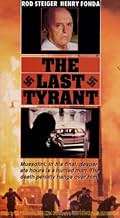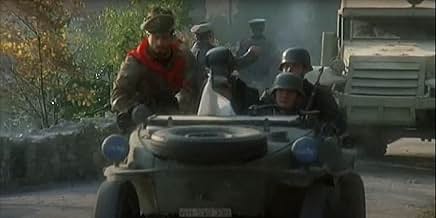In 1945, the dictator of fascist Italy and Hitler's close ally Benito Mussolini faces defeat. In a desperate attempt to avoid capture, he tries to flee the country with his lover Claretta Pe... Read allIn 1945, the dictator of fascist Italy and Hitler's close ally Benito Mussolini faces defeat. In a desperate attempt to avoid capture, he tries to flee the country with his lover Claretta Petacci, but Italian partisans are on their tail.In 1945, the dictator of fascist Italy and Hitler's close ally Benito Mussolini faces defeat. In a desperate attempt to avoid capture, he tries to flee the country with his lover Claretta Petacci, but Italian partisans are on their tail.
Rodolfo Dal Pra
- Rodolfo Graziani
- (as Rodolfo Dal Pra')
Bill Vanders
- Hans Fallmeyer
- (as Bill Wanders)
Featured reviews
Rod Steiger once again showed his ability to play roles of political and historical men. In the past he was Al Capone, Napoleon, Gen. Ulysses S. Grant, Pontius Pilate, and Mussolini twice (also in "Lion of the Desert" ,1980). At his last minutes he was a kind of Mussolini humble, lost, not knowing what to do once he was arrested. Very good acting also from Henry Fonda playing the role of Milanese Cardinal Schuster, he worries more about Mussolini's fate than of those innocents who may have died during those days. The film showed well how Germans wanted to keep Mussolini and the efforts of the Americans to capture him. The director Lizzani did an excellent work trying to show these last hours of the dictator and his lover, Claretta Petacci (Lisa Gastoni). Very interesting dialogues were shown between the guerrilla fighters and Mussolini. He claimed that only Germans guilty of the war, and that he had very little responsibility on what happened, but the fighters refused all his coward arguments with real facts. Mussolini destroyed Italian democracy, eliminated political parties and unions, and also killed many innocent people. He supported well Hitler although he was a puppet in the hands of the Germans. I do not know whether Mussolini was killed together with his lover in a way it is shown in the film. What is known is that he tried to cross the border disguised as a German soldier in a convoy of trucks retreating toward Innsbruck, Austria. He was recognized and together with Claretta shot in an area closed to Como. Until here the plot must be accepted, but I wonder why Lizzani did not want to show further this history, i.e. that the bodies were hung, head downward, in the Milanese Piazza Loreto in Milan.
9I.K
The movie tells the story of "Il Duce´s" or Benito Mussolini´s last days. Abandoned by his black shirts and supporters, Mussolini is haunted by the Partisans, Allies, and even the Germans (who want bring him to Germany) Due to the great performance of Rod Steiger (Mussolini) and interesting plot + good music this is the best Italian movie I have seen.
Carlo Lizzani's Mussolini: Ultimo Atto isn't much of a "movie", it has all the cinematic flair of a TV docudrama, with stiff dialogue and zero visual imagination. But where it succeeds is in tearing down the Fascist myth.
Instead of the blustering Duce of propaganda, we get the real Mussolini: a pathetic, dithering coward stumbling through his final days, hiding, lying, and clinging to scraps of dignity he never had.
History books tell you how it ended; this film shows you why it was inevitable.
Not fun, not stylish, but effective in its grim way. And honestly, seeing Mussolini reduced to a whimper instead of a roar feels like the only satisfying ending he deserved.
Instead of the blustering Duce of propaganda, we get the real Mussolini: a pathetic, dithering coward stumbling through his final days, hiding, lying, and clinging to scraps of dignity he never had.
History books tell you how it ended; this film shows you why it was inevitable.
Not fun, not stylish, but effective in its grim way. And honestly, seeing Mussolini reduced to a whimper instead of a roar feels like the only satisfying ending he deserved.
Ten years earlier Carlo Lizzani directed 'Processo di Verona' which depicted the trial and execution of Count Ciano, son-in-law of Benito Mussolini. In that film Mussolini is only spoken of and appears briefly in newsreels. He is very much in evidence here in the person of Rod Steiger. In what is for him a subdued performance he captures brilliantly the air of resignation of a man stripped of his power who has a growing realisation that he will not be saved by the Allies and that his days are numbered. This is a far cry from the strutting, bombastic Mussolini that Steiger was to portray later in 'Lion of the Desert'. There is also an outstanding performance by Lisa Gastoni as his mistress Claretta Petacci who wishes to die with him and whose wish is certainly granted! Scene stealer Henry Fonda appears as Cardinal Schuster which serves to remind us of the connection between the Catholic Church and Fascism, although by all accounts Schuster distanced himself from Mussolini's extreme policies. Lizzani's film lacks the edge and momentum of his earlier one but still has some excellent scenes, is visually impressive and serves as a powerful historical document.
Mussolini portrayed more as a man than a political figure. Forgotten by his own supporters, the "brave" (lol) "camice nere", he faced all the hardship to be left alone. He acted as a coward (trying to save his life in a nazi truck). Anyway, I liked the most the scene in which he was questioned by a partisan about his real nationalism (all italian people wanted to get into WWII?!?) and his relationship with Hitler (mostly about Russian war).
Did you know
- TriviaRod Steiger would portray Benito Mussolini again, this time in the 1980 film Lion of the Desert.
- ConnectionsFeatured in Legends of World Cinema: Rod Steiger
- How long is The Last 4 Days?Powered by Alexa
Details
- Runtime
- 1h 31m(91 min)
- Sound mix
- Aspect ratio
- 1.85 : 1
Contribute to this page
Suggest an edit or add missing content



































